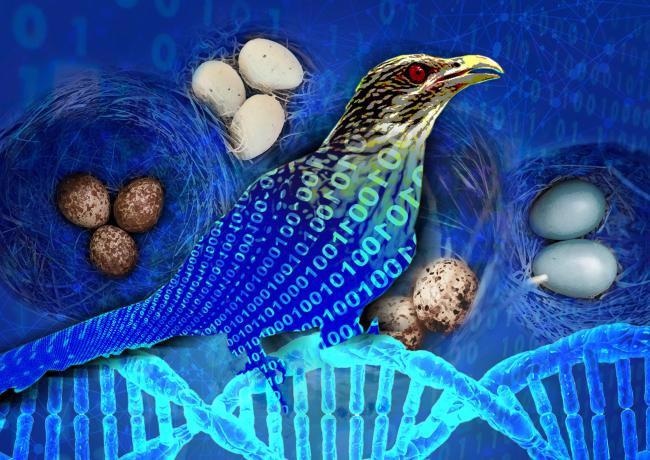Jan 15 2021
At the U.S. Department of Energy’s Ames Laboratory, computational materials science experts optimize an algorithm that is based on the nesting habits of cuckoo birds, thereby decreasing the search time for new high-tech alloys from weeks to just seconds.
 Computational materials scientists at Ames Laboratory developed an evolutionary algorithm, using a hybrid version of a computer program called Cuckoo Search (CS), which mimics the brood parasite behavior of cuckoo birds. Image Credit: U.S. Department of Energy, Ames Laboratory.
Computational materials scientists at Ames Laboratory developed an evolutionary algorithm, using a hybrid version of a computer program called Cuckoo Search (CS), which mimics the brood parasite behavior of cuckoo birds. Image Credit: U.S. Department of Energy, Ames Laboratory.
The researchers have been analyzing a type of alloy known as a high-entropy alloy, an innovative class of materials that are highly desired for several exceptional and possibly useful properties.
The alloys are lightweight in terms of their strength, exhibit high corrosion and oxidation resistance, are fracture-resistant, and better endure high-pressure and high-temperature surroundings. All these properties make them appealing materials for applications in nuclear energy, space exploration, aerospace industry, and defense.
Although these materials are highly promising, they present significant challenges to researchers looking to search and tailor them for use in technologies. Since these alloys are built using five or more different elements, they are costly and hard to design and search in an experimental way, which makes an Edison-like method not viable.
These materials are made of several ingredients and can be developed in many different ways, and thus can be designed with almost infinite permutations of recipes. Of the billions of available options, in what ways can scientists narrow their search to some excellent potential candidates for an application?
In this case, the solution is an evolutionary algorithm that involves using a hybrid version of a computer program developed a decade ago, known as Cuckoo Search (CS). Cuckoo birds are brood parasites that tend to lay their eggs in the nest of a host bird in such a way that they eventually rear the stronger, bigger cuckoo chick as one of its own.
This ‘survival of the fittest’ strategy from the behavior of birds is the idea behind Cuckoo Search.
Duane Johnson, Computational Materials Scientist, Ames Laboratory
Each egg depicts a potential solution and competes to be the best solution in any specified nest in a fixed number of possible nests. The best solution from each nest competes against that of other nests until the best solution is arrived at.
The Ames Laboratory researchers added a new twist to the Cuckoo Search, which considerably expedited the process of finding optimal alloys or the best “egg” from a great number of possibilities. The original CS leverages a mathematical principle known as Lévy flight, which is employed by computational theorists to their benefit in searching extremely huge data sets.
However, although this approach works for huge data sets, the Ames researchers discovered that pairing another mathematical principle, a Monte Carlo algorithm, with Lévy flight considerably decreased the time needed for realizing ideal candidates for high-entropy alloys, thereby offering the best possible models nearly on the fly.
With the model-building bottleneck eliminated, computational design can be performed that is currently impractical. As our hybrid CS is problem-agnostic, it offers application in optimization in many diverse fields.
Duane Johnson, Computational Materials Scientist, Ames Laboratory
Journal Reference:
Singh, R., et al. (2021) Accelerating computational modeling and design of high-entropy alloys. Nature Computational Science. doi.org/10.1038/s43588-020-00006-7.